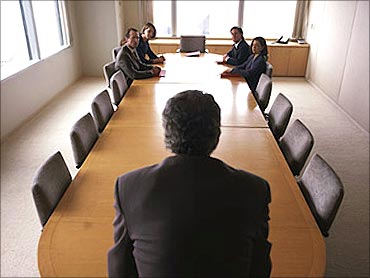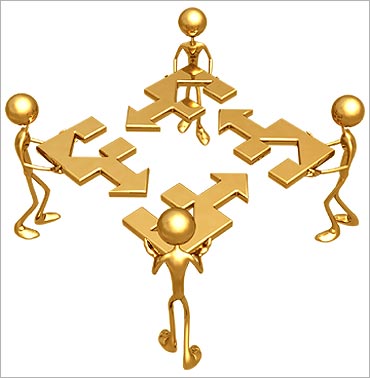How to become a great leader
Last updated on: February 23, 2011 08:48 IST
Does your team know where it is heading? Have you defined and communicated the future you want? Managers often say they are carried away by events. They don't make decisions in conscious pursuit of some longer-term goal.
In this extract from the book
Being the Boss: The 3 Imperatives for Becoming a Great Leader, authors Linda A Hill and Kent Lineback discuss why it is important for a team to prepare for future and how to go about it.
It talks about the benefits of a plan that guides your team through change the future often brings.
Excerpts: Some managers are slow to realise that their responsibilities go beyond simply keeping their groups running smoothly today. They're also responsible for the future and the results they produce there.
Click NEXT to read on

How to become a great leader
Last updated on: February 23, 2011 08:48 IST
Do you feel responsible for the future? Pay attention, because it will inevitably be different from today - for three reasons:
You want it to be different. You and your group aspire to be better - faster, cheaper, higher quality. Or you want to grow. Or you want to innovate.
Your organization wants it to be different. It's pursuing a new strategy. Or the people you serve and depend on, who make up your network, are changing.
Outside forces are changing the world around you no matter what you want. Even if you continue doing the same work, the context in which you operate is constantly shifting, and you must adapt. Your only choice is to move forward or lose ground.
Click NEXT to read on

How to become a great leader
Last updated on: February 23, 2011 08:48 IST
Preparing for these changes is called "making a plan," which, too often for many managers, consists of a document in a notebook identifying steps they will take next month, next year, sometime in the future.
But a plan is more than a to-do list with dates. It's about defining and proactively creating the future you want - what many refer to as thinking strategically, not just tactically.
Strategic thinking focuses on the longer range and what's important if you want to achieve your goals not just now but into the future.
It's about asking such basic questions as, "What are we really trying to do?" or "Should we change the way we do our work in some basic way - is there a better way?" or "What will we be doing in the future and how will that differ from our work now?"
On the other hand, tactical thinking is about the short term and focuses on accomplishing today's work on time, on budget, and per specification.
Click NEXT to read on

How to become a great leader
Last updated on: February 23, 2011 08:48 IST
Some people will tell you that strategic thinking is the province of only senior managers and executives. We disagree.
All managers at all levels must concern themselves with both the short term and the long term, the tactical and the strategic, within the context of the groups they run. That's why your plan needs to be much more than a schedule of near-term activities.
Done well, a plan defines the meaning and context of the work you and your team do, identifies the forces shaping your world, and describes both the future you want and your strategies for creating it.
In short, it's the foundation for virtually everything you do as a manager. When we refer to planning or your plan, we're referring to all those elements, not that notebook gathering dust in your bookcase.
Click NEXT to read on

How to become a great leader
Last updated on: February 23, 2011 08:48 IST
What are the benefits of defining the future?
The benefits are many.
* Defining the future fosters commitment within your team by imbuing its work with purpose: It makes explicit that you're all doing something worthwhile together, and so it fosters that sense of shared purpose, that sense of "we" common to every effective team.
People relate to worthwhile purposes and goals. Most of us want to feel part of something larger and more important than ourselves. When workers were asked how important it was that their lives be meaningful, 83 per cent said "very important" and another 15 per cent said "fairly important."
That's an astounding 98 per cent to whom it was at least "important." Is it important to you and those who work for you? Most likely, it is.
The same survey revealed that less than half of all employees in every industry studied felt strongly connected to their company's purpose.
Click NEXT to read on

How to become a great leader
Last updated on: February 23, 2011 08:48 IST
Most organisations - whether a small group or a large company - are missing a great opportunity by not focusing more on why they do what they do and why they matter in the world.
"Well," we sometimes hear managers say, "it's easy to find real purpose in some lines of work - like health care or education. But it's not easy in most."
When someone says that, we think of a story we heard about employees in a pet food plant who were asked to write a mission statement, a description of their fundamental purpose.
What they produced didn't mention "excellence" or talk about making the "best" pet food. It began, "Pets are important to people." Those workers didn't just make pet food. They contributed to the happiness of people who owned pets.
Click NEXT to read on

How to become a great leader
Last updated on: February 23, 2011 08:48 IST
Purpose is possible in any field. The survey just cited also revealed that at least 25 per cent of workers in retail, finance, and chemical manufacturing - not fields known for their inherent "good of mankind" motives - strongly felt their work was important because of their company's purpose.
Almost all work, directly or indirectly, immediately or ultimately, provides benefit for someone or some group. Identify that customer or ultimate user, and the benefit, and you're well on your way to finding a compelling purpose...
No job is meaningless. Identifying purpose and making it explicit can transform a job into a calling instead of a career stepping-stone or just a way to pay the rent.
In a virtual workplace, where members of a group rarely gather face-to-face, a strong sense of purpose can be the glue that holds them all together.
Click NEXT to read on

How to become a great leader
Last updated on: February 23, 2011 08:48 IST
* Defining the future gives everyone on your team a common goal and direction: Specific goals and objectives anchor purpose in tangible reality and satisfy people's desire to strive toward something both challenging and meaningful.
Clear goals foster that sense of "we" at the heart of every real team by helping team members pull together toward the same destination.
In a study of group performance, only those groups with a challenging goal were able to create the internal bonds that convert a collection of people into a true team.
A related benefit is that a plan, especially the process of developing it, can help surface any cultural or generational differences that group members bring to their collective work...
Click NEXT to read on

How to become a great leader
Last updated on: February 23, 2011 08:48 IST
* Defining the future keeps you, your team, and your network focused on what's important : A plan gives you perspective for making decisions.
It provides a framework, a set of guidelines, for how to assign resources and make choices. It will help all concerned concentrate on what will produce the results you want, even in the midst of daily crises and chaos.
It will tell you, as manager, where to focus special attention, where to stay involved, and even where you may need to immerse yourself in the ongoing details.
Being "managerial" or "strategic" doesn't mean staying above everything. It means staying in close touch with the right things, the strategies and initiatives that truly matter, without doing the work yourself or micromanaging those who do...
Click NEXT to read on

How to become a great leader
Last updated on: February 23, 2011 08:48 IST
* Defining the future is the basis for your strategic network: Without a plan, you cannot define your future needs and priorities and how they'll differ from today's. Without that knowledge, you cannot identify the individuals and groups who may not be important to you today but will be tomorrow...
* Defining the future will help you deal with unforeseen change: Paradoxically, making a plan is worthwhile even if conditions change and you cannot pursue it as intended.
Planning is worthwhile because the process of thinking about the future will prepare you for contingencies. Dwight Eisenhower, allied commander and later US president, led the landings in Normandy on D-day in 1944 that turned the course of World War II in Europe.
Click NEXT to read on

How to become a great leader
Last updated on: February 23, 2011 08:48 IST
After all the planning required by that immensely complicated operation, he concluded, "Plans are nothing. Planning is everything."
Few plans survive contact with reality completely intact. If you've prepared a plan thoughtfully, and considered alternatives and contingencies carefully, you'll be better positioned to deal with whatever arises.
* Defining the future is crucial to the success of virtual teams: For virtual teams, that sense of shared purpose and goals can form bonds among members, even when they lack the daily interaction that creates ties among members of colocated teams. In short, defining the future creates the context for virtually all you do as a manager.
It helps you create the right relationships with your people and assess daily problems so emergencies are less likely to supplant what's truly important. Not only will a plan help you identify who should be in your network, it will help you use your network more effectively.
Click NEXT to read on

How to become a great leader
Last updated on: February 23, 2011 08:48 IST
A plan creates a context for delegation by making clear what activities are most important and should be delegated with greater care.
A plan also creates a framework for making ethical judgments by helping you weigh the conflicting needs of stakeholders - in short, by helping define a greater good.
If you're a producing manager, a plan will help you balance your dual responsibilities for both personal accomplishment and management.
It's easy for producing managers to slight their management duties because the pressure to produce as individuals always feels more tangible and urgent than the requirements of being a boss.
Click NEXT to read on

How to become a great leader
Last updated on: February 23, 2011 08:48 IST
So never think of your plan as a mere document in a notebook you put on the shelf. It should be something you and your people live and breathe every day as a way to focus effort, screen activities, and manage time.
A good plan invests everything you do with vital meaning and provides a framework for dealing with whatever arises.
Have you and your group defined the future you want? Do you have a plan? Does it play the key roles just outlined?
Reprinted with permission from Harvard Business Press. Copyright 2011 Linda A Hill Kent Lineback.
Being The Boss: The 3 Imperatives For Becoming A Great Leader
Authors: Linda A Hill & Kent Lineback
Publisher: Harvard Business Press
Price: Rs 695
ISBN: 9781422157398
Source:
















